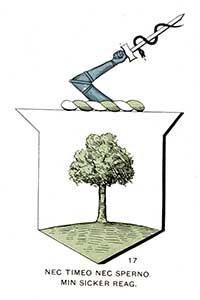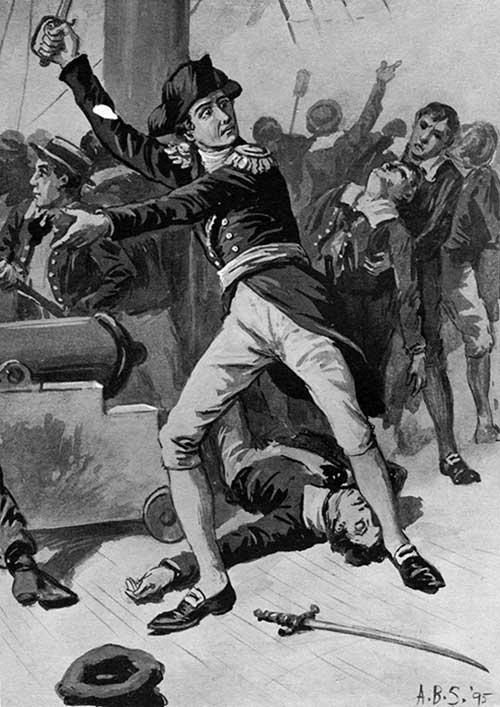The Barry Family

(Crest No. 17. Plate 4.)
THE Barry family is descended from Milesius, King of Spain, through the line of his eighth son, Heremon. The O’Barrys belonged to the Clanna Failge tribe, from its founder, Rossa Failge, son of Cathire More, King of Ireland, A. D. 144. The ancient name was Bearra, and signifies “The Short.”
The chiefs of this sept held possessions in the present Counties of Mayo and Sligo. The O’Barrys were also located in the County of Cork.
These O’Barrys were chiefs of Muintir Bari, a territory and foreland comprising part of ancient Carbery, in the present County of Cork. They were of the Ithian or Lugadian race, through the line of Ith, uncle of Milesius, and were descended from Fathaidh Airgthech, a King of Munster in the third century, according to O’Heerin, who thus designates them:
“Muintir Bari of the fair fortress,
They are of the race of Fathaidh Airgthech;
O’Bari rules over the land of waves,
Which is not surpassed by the smooth plains of Mana.”
The O’Barrys, with the Roches, attacked the Hodnetts, who had held Great Island, in Cork Harbor, for a hundred and fifty years; slew Lord Philip Hodnett and all of his adherents, and took possession of the island, in 1329. They named it Barrymore, by which it was known down to a recent period. Their ancient castle of Barry’s Court stood on the mainland in the neighborhood, and is to-day a stately pile, having been renovated half a century ago.
In the reign of Elizabeth the Barrys were the most powerful family outside the walls of Cork, and possessed Shandon Castle. They were among the foremost in harassing the English burghers who held Cork City, then described by Camden as “a populous little trading town,” but “beset with rebel enemies.” The Barrys and the other “rebel enemies” frequently forayed up to the gates of the city, and for a long time terrorized its English occupants. In 1642 Barry, the confederate General, and Lord Muskerry attacked the city unsuccessfully, but two years later they captured it.
Spranger Barry, an eminent actor, was born in Dublin in 1719, and for a time divided the favor of the London stage with Garrick. In some respects he is said to have excelled every actor on the stage during his time. He is described as remarkable for habits of magnificence and profuse hospitality, and for mean cleverness in putting off creditors. He died in 1777, and was buried in Westminster Abbey.
Sir David Barry, a distinguished physician, physiologist and mathematician, was a native of Roscommon, where he was born in 1780. He served as surgeon in the British army during the Peninsular War, and subsequently settled at Oporto, as surgeon to the Portuguese troops. On his return to England he was engaged by the Government in many important medical inquiries. He published the results of his many researches, which exhibit much learning and ability.
James Barry, the celebrated artist, was born in 1741 in a suburb of Cork City. At the age of twenty-two the genius of his paintings attracted the attention of Edmund Burke, who sent him at his personal expense to Rome, where the young artist studied five years. After his return to London he was one of the brilliant circle that surrounded Johnson, Burke and Reynolds. Of one of his paintings Johnson remarked: “Whatever the hand may have done, the mind has done its part. There is a grasp of mind there which you will find nowhere else.” When Canova was in London he declared that had he known of the existence of such a work as Barry’s “Victors at Olympia” he would have made the voyage to England solely for the purpose of seeing it.
Commodore John Barry, the first commander of the United States Navy, was also a descendant of these Munster Barrys. He was born on the seashore of the County of Wexford, Ireland, in 1745. In April, 1776, he was commissioned Captain by Congress. With his boats in the Delaware, as well as by the capture of the “Edward,” the “Atalanta” and the “Trepassy” at sea, and his disciplinary efforts, he won the proud title of “Father of the American Navy.” With him Dale, Decatur, Murray and Stewart served their apprenticeship of glory.

COMMODORE JOHN BARRY,
“Father of the American Navy.”
